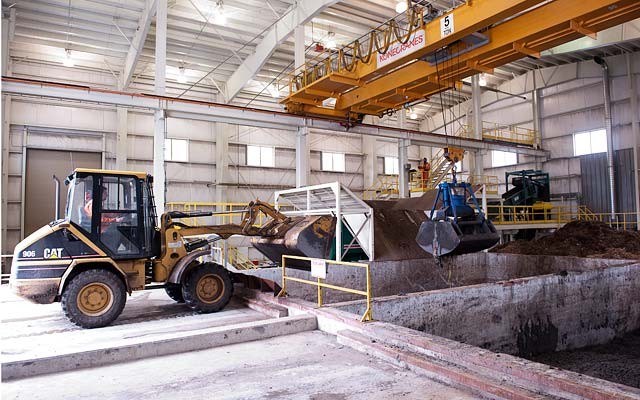The municipality is investigating the possibility of a $1.7 million conversion at the municipal composter that would produce biofuel for sale rather than soil.
A preliminary assessment of the biofuel conversion, outlined in a report to the municipality, reveals there could be cost savings if the project moves ahead but a business case, as well as an environmental case, has yet to be developed.
The investigation is part of a comprehensive look at ways to reduce Whistler's solid waste costs and make the multi-million system more effective and efficient.
While it's still early days, Councillor Jack Crompton has already indicated to municipal staff that he would like to see more research on the project to be convinced of its merits.
"My main concern is I want to see the evidence that this makes sense," said Crompton this week.
"Waste incineration is a major concern for me because I think it may conflict with our zero waste goals.
"I question whether waste incineration should be considered diversion of waste."
Biofuel is fuel that comes from organic matter, in Whistler's case the commercial and residential food waste that is diverted to the municipal composter. The waste could potentially be converted to biofuel and then sold to the market.
Currently, that food waste is mixed with wood chips and the town's biosolids and turned into nutrient-rich topsoil, which is then sold.
The $13.7 million dollar facility has been working in that capacity for almost five years, at an annual cost of $102 per year per taxpayer.
But could the facility create a bigger return on investment?
The municipality confirmed this week that the possibility of using the composting system to produce biofuel has been considered since the facility was first moved to the Callaghan Valley in 2007.
The 2013 report from Paul Manley, senior consultant with Morrison Hershfield, states: "A business case economic analysis needs to be carried out, which is beyond the scope of this preliminary assessment, to accurately determine the operating cost savings and revenue potential when generating biofuel as compared to generating and selling compost."
That work is now underway.
Manley explained in his report that the greatest operating cost savings would come from eliminating the cost of trucking, curing and screening the compost soil in Squamish.
The preliminary report also looked at the market potential for selling biofuel. In particular there were discussions with cement manufacturers including Lehigh in the Lower Mainland.
The report states: "Lehigh indicated an interest in the fuel, since they have an extensive program already underway to utilize alternative fuels in order to replace the fossil fuels they use now.
"Although the cement industry represents the greatest immediate opportunity for the sale/use of biofuels there is growing interest in the market place for biofuels to replace traditional non-renewable fossil fuels. More detailed work is needed to explore other potential markets."
The municipality's next steps are now to identify the acceptable moisture levels in the biofuel, evaluate the costs of the potential upgrades and possibly produce some biofuel with the existing facility to enable full-scale test of the material, among other things.
Crompton said: "It is a big expense that we need to be able to prove will pay off in the long term."
The biofuel report is one of a number of technical studies and assessments commissioned by the municipality in the last year to prepare for potential improvements to the system. Other studies include: Whistler Zero Waste Plan — Strategies for Garbage Reduction and Whistler Composting Operations — Cost-Benefit Study.
The actions that had the best cost/benefit analysis were recommended in the Solid Waste Management Strategy endorsed by council in early July.




